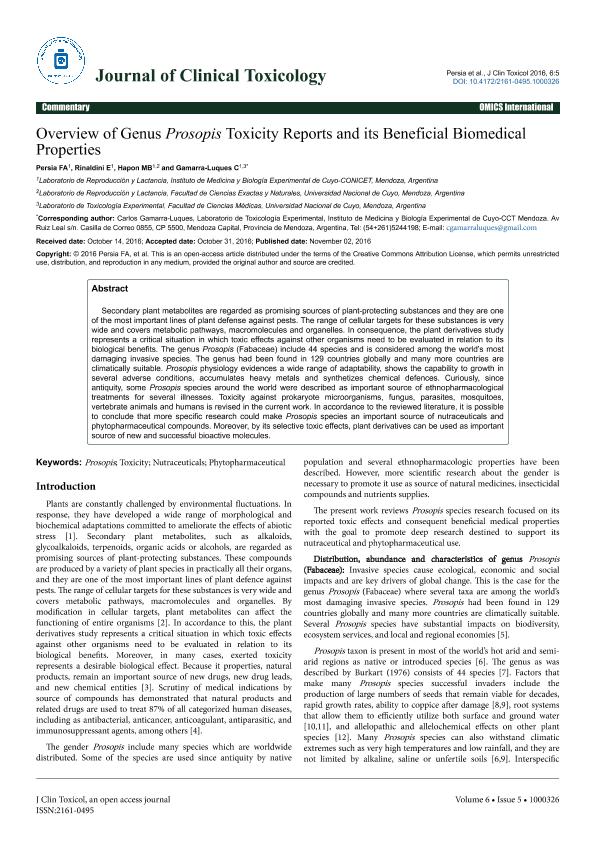Artículo
Overview of Genus Prosopis Toxicity Reports and its Beneficial Biomedical Properties
Fecha de publicación:
11/2016
Editorial:
OMICS
Revista:
Journal of Clinical Toxicology
ISSN:
2161-0495
Idioma:
Inglés
Tipo de recurso:
Artículo publicado
Clasificación temática:
Resumen
Secondary plant metabolites are regarded as promising sources of plant-protecting substances and they are one of the most important lines of plant defense against pests. The range of cellular targets for these substances is very wide and covers metabolic pathways, macromolecules and organelles. In consequence, the plant derivatives study represents a critical situation in which toxic effects against other organisms need to be evaluated in relation to its biological benefits. The genus Prosopis (Fabaceae) include 44 species and is considered among the world’s most damaging invasive species. The genus had been found in 129 countries globally and many more countries are climatically suitable. Prosopis physiology evidences a wide range of adaptability, shows the capability to growth in several adverse conditions, accumulates heavy metals and synthetizes chemical defences. Curiously, since antiquity, some Prosopis species around the world were described as important source of ethnopharmacological treatments for several illnesses. Toxicity against prokaryote microorganisms, fungus, parasites, mosquitoes, vertebrate animals and humans is revised in the current work. In accordance to the reviewed literature, it is possible to conclude that more specific research could make Prosopis species an important source of nutraceuticals and phytopharmaceutical compounds. Moreover, by its selective toxic effects, plant derivatives can be used as important source of new and successful bioactive molecules.
Palabras clave:
Prosopis
,
Toxicity
,
Nutraceuticals
,
Phytopharmaceutical
Archivos asociados
Licencia
Identificadores
Colecciones
Articulos(IMBECU)
Articulos de INST. DE MEDICINA Y BIO. EXP. DE CUYO
Articulos de INST. DE MEDICINA Y BIO. EXP. DE CUYO
Citación
Persia, Andres; Rinaldini, Estefanía; Hapon, María Belén; Gamarra Luques, Carlos Diego; Overview of Genus Prosopis Toxicity Reports and its Beneficial Biomedical Properties; OMICS; Journal of Clinical Toxicology; 6; 5; 11-2016; 1-7
Compartir
Altmétricas




